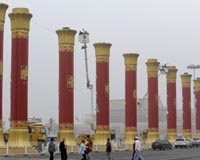 |
Beijing (AFP) Sept 27, 2009 Sixty years ago, 19-year-old Geng Zhifeng looked up in elation as revolutionary leader Mao Zedong stood on the Tiananmen rostrum and proclaimed the founding of the People's Republic of China. It is a moment seared forever into Geng's memory, and which the nation of 1.3 billion people will celebrate on Thursday with a military parade and carefully choreographed mass performances in Tiananmen Square. "Everyone was clapping, waving red flags, and chanting 'Long live Chairman Mao, long live Chairman Mao,' said Geng, 79, making sweeping hand gestures as he described the "grand" scene. "We had been liberated. How could we not be happy about the founding of the People's Republic of China?" Geng said, sitting outside the tiny brick home in one of Beijing's historic neighbourhoods where he has lived for 69 years. China has launched a massive security operation for this week's National Day festivities amid rising social and ethnic unrest, and it continues to face criticism over its human rights record and lack of democratic politics. But for those who remember the old days, pre-1949, the holiday remains a cause for celebration, offering insight into how the Communist Party continues to command strong support among China's vast population. Like countless millions of Chinese before the communist "liberation", Geng and his family struggled to survive in a traumatised, war-shattered country, and life was full of hardship for the low-paid electrician. His father and younger brother had died of illnesses they could not afford to treat. Food shortages were routine. Post-1949, he beams, the Communist Party came through with jobs, a social safety net and medicine for the masses. "So before liberation our lives were very difficult. But after liberation, there was no comparison," he said. Wu Pei, now 81, also was at Tiananmen on October 1, but, as a destitute 21-year-old labourer worried about where his next meal would come from, thoughts of political change were far from his mind. "At the time, the prices of commodities could change eight times in one day. There was a long waiting line every day when I went to buy rice," he said. "We knew that after liberation our lives would be better, but we didn't think much about the country -- just our own lives." Wu made about 50 yuan (seven dollars at today's rates) a month in 1949. Thanks to the party, his retirement pension today is 2,000 yuan per month -- much more than he needs, he boasts. Like other witnesses to the events of 1949, he is full of pride over rising living standards in China and the country's re-emergence as a global economic, military and political power. "The changes have been great, earthshaking," said Wu. "We could not have foreseen that things could have turned out like this. We only thought it would be better, but never this good." For those who witnessed China on its knees, even dark times such as the social chaos of the Cultural Revolution and disastrous Communist economic policies are dismissed as bumps in the road that had their upsides. The Cultural Revolution, for example, was the impetus for Deng Xiaoping's momentous economic reforms that restored China's strength, Wu said. "(The Cultural Revolution) created huge waste in society, and brought much misfortune. But it helped to liberate our thinking," Wu said. But not everyone will be celebrating on October 1. Dissident Bao Tong was a 16-year-old budding party cadre in Shanghai in 1949 when the news of Mao's proclamation was broadcast. He remembers rushing into the streets with crowds of others to rejoice. "We were all so thrilled. A light rain came but everyone kept celebrating very happily," he said. Bao later became a close aide to former Chinese leader Zhao Ziyang, but was dragged down along with him when he was purged for opposing the use of force on the 1989 Tiananmen Square demonstrations. "In 1949, I thought the Chinese people had really been liberated. We were freed, and would not be oppressed anymore. Everyone would be able to speak their minds, and to work, and to eat," Bao said. "I was very excited. But in the end, I realised it was not to be." Share This Article With Planet Earth
Related Links China News from SinoDaily.com
 Excitement, irritation as China readies for National Day
Excitement, irritation as China readies for National DayBeijing (AFP) Sept 27, 2009 Liu Tongbo trudged through Beijing looking for transport as the city centre shut down to make way for an unusual sight -- a stream of colourful floats, student performers... and missile-laden vehicles. "I live in the suburbs but the tube isn't stopping in the city centre where I work, so I've been walking for 30 minutes," the 45-year-old businessman said as the capital launched its final ... read more |
|
| The content herein, unless otherwise known to be public domain, are Copyright 1995-2009 - SpaceDaily. AFP and UPI Wire Stories are copyright Agence France-Presse and United Press International. ESA Portal Reports are copyright European Space Agency. All NASA sourced material is public domain. Additional copyrights may apply in whole or part to other bona fide parties. Advertising does not imply endorsement,agreement or approval of any opinions, statements or information provided by SpaceDaily on any Web page published or hosted by SpaceDaily. Privacy Statement |